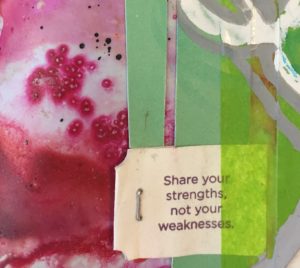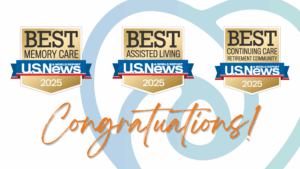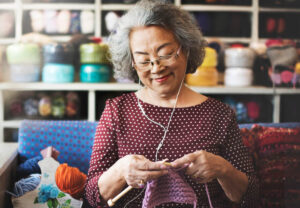When you participate, you contribute to advances in science and medicine, create new knowledge, and shape best practices.
Have you ever participated in research? What was your experience like? Did you wonder if your contribution made an impact? As a researcher, I can speak for myself and say that I am so endlessly grateful to all the participants, not just for their time but for the wisdom and insight they shared. I hear the same thing from the students I work with: at first they worry that no one will want to participate and then they get so excited about all the things they learn from and with their participants. Participating in a clinical trial, volunteering for a social science study, or answering polls can be a way to be connected to your community and contributing to the advancement of healthcare and human knowledge.

Several Elder Care Alliance employees attended the recent Aging in America conference in San Francisco. In one keynote session, stakeholders from clinical research to cure Alzheimer’s disease spoke about how difficult it is to recruit and retain participants. In order to advance science and cure diseases like Alzheimer’s, we need to continue testing and evaluating the efficacy of different treatment protocols. The most powerful part of the keynote came from a man named Brian. Brian became an advocate after being diagnosed with Alzheimer’s disease. He shared about how meaningful it was to him to get to participate in research and to meet the researchers devoting their lives to finding a cure. When asked what he would say to encourage others to participate he simply said “do it.” He spoke about how incredibly important it is for the future and how great it makes him feel to be part of the process.
So you want to participate in research, what now?
- Researchers will provide you with an informed consent, which will outline all your rights as a participant. You can also familiarize yourself with the California version of the Human Subjects Bill of Rights.
- Check out The Alliance for Aging Research. They have information about current research initiatives and reports about findings across many different types of research.
- Don’t rule out student research! If you live near a college or university, take a walk through the social sciences buildings–you may see many different fliers with different opportunities to participate. Alternatively, you can ask a friend or family member with access to these settings.
- If you are interested in participating in a clinical trial, talk to your medical provider. She or he may be able to suggest some opportunities. A 2013 poll found that older adults, if invited by a trusted provider, were willing and interested in contributing health data or participating in trials. Research stakeholders are partnering with transportation providers to enable participation. If you want to participate but are worried about how to get to and from the research site, ask if there are options available.
- Once you participate, ask how you can stay involved! It is rewarding to see the findings in their final form and know you were part of something larger. Many researchers are happy to tell you about their future goals and their intentions for their research.
- If you live in an Elder Care Alliance community, there are ongoing opportunities to participate in student research, inquiry processes with stakeholders from the arts and technology fields, and ongoing internal research. Some of the students have gone on to publish their findings in peer-reviewed journals, meaning residents in our communities are now part of the academic literature!
 Research at Elder Care Alliance
Research at Elder Care Alliance
Our research philosophy is strength-based; we believe older adults have a wealth of lived experiences and invaluable knowledge to share. We also believe care partners–the family, friends, and professionals who support older adults–have a great deal to contribute to the field of aging. We are excited to welcome different researchers into our buildings if their research questions contribute to the field and are inclusive of the people who will be participating. We believe it is important for research in all fields to consider the voices of older adults. We encourage all older adult research participants to adopt this philosophy–sharing your strengths through participation.




















